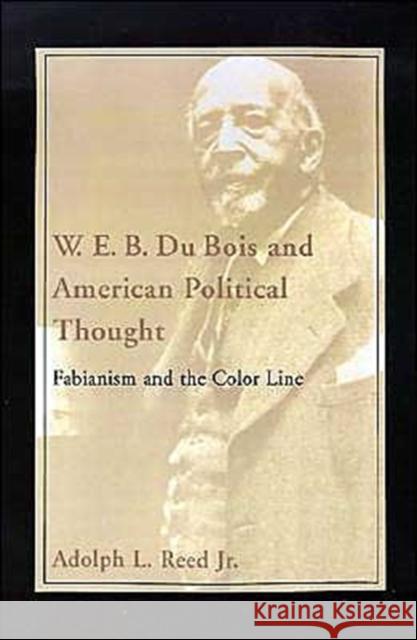W.E.B. Du Bois and American Political Thought: Fabianism and the Color Line » książka
W.E.B. Du Bois and American Political Thought: Fabianism and the Color Line
ISBN-13: 9780195051742 / Angielski / Twarda / 1997 / 296 str.
W.E.B. Du Bois and American Political Thought: Fabianism and the Color Line
ISBN-13: 9780195051742 / Angielski / Twarda / 1997 / 296 str.
(netto: 394,87 VAT: 5%)
Najniższa cena z 30 dni: 383,31
ok. 16-18 dni roboczych.
Darmowa dostawa!
In this pathbreaking book, Adolph Reed, Jr. covers for the first time the sweep and totality of W. E. B. Du Bois's political thought. Departing from existing scholarship, Reed locates the sources of Du Bois's thought in the cauldron of reform-minded intellectual life at the turn of the century, demonstrating that a commitment to liberal collectivism, an essentially Fabian socialism, remained pivotal in Du Bois's thought even as he embraced a range of political programs over time, including radical Marxism. Exploring the segregation-era political discourse which informed Du Bois's texts, and identifying the imperatives which triggered Du Bois's strategic political thinking, Reed reveals that Du Bois's core beliefs concerning such ssues as the relationship between knowledge and progress, social stratification among blacks, and proper social organization, endured with little change from their early formulation in The Philadelphia Negro (1899). Reed's discussion, in addition to demonstrating the theoretical rigor and integrity of Du Bois's work over nearly six decades, involves a suggestive remapping of the history of progressive thought in this span, bringing clearly into view previously unexamined continuities and tensions between fin de siecle and later twentieth-century socialist and Marxist discourses.
Illuminating the foundations and course of Du Bois's political thought, Reed also considers the way this thought has been interpreted. Exposing recent vindicationist, de-politicizing, and transhistorical trends in Du Bois studies, Reed devotes special attention to recent misreadings of Du Bois's concept of "double- consciousness." Tracking the source of these trends to troubling currents in contemporary Afro-American, literary, and cultural studies, Reed offers a compelling alternative approach to the writing of the history of political thought, one that anchors inquiry to contemporary concerns while requiring the kind of thick historical grounding too often missing in recent scholarship. American intellectuals and activists of this century, Eloquent and far-reaching, W. E. B. Du Bois and American Political Thought is an indispensable study of Du Bois's thought and holds clear implications for Americanists, African- Americanists, and those doing theory-inflected work in the humanities.










